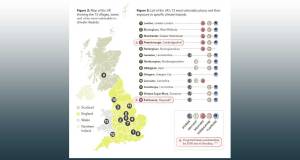- General
- Posted
New Licence Plus scheme undermines retrofit standards, experts say
This article was originally published in issue 44 of Passive House Plus magazine. Want immediate access to all back issues and exclusive extra content? Click here to subscribe for as little as €15, or click here to receive the next issue free of charge
Leading retrofit experts are concerned that TrustMark’s new Licence Plus scheme for domestic retrofit installers and contractors threatens to undermine years of work to improve retrofit standards.
TrustMark launched Licence Plus in September last year to “enable more quality retrofit energy efficiency improvement installations to be made to the millions of homes across the UK”. The scheme is intended to demonstrate the “competency and quality” of participating installers to deliver retrofit.
However, key figures in the retrofit sector expressed concern that the introduction of the scheme would put the existing BSI Retrofit Standards Framework, and in particular the PAS 2035 standard, on the backseat and pose a threat to retrofit quality.
Some members of the BSI Retrofit Standards Task Group that Passive House Plus spoke to felt that Licence Plus had been introduced following political pressure to develop a less onerous alternative to PAS 2035.
PAS 2035 was developed by the BSI to help safeguard homes and occupant health from the consequences of bad retrofit, following the 2016 Each Homes Counts review into retrofit failures. Licence Plus appears to omit a number of PAS 2035 quality control elements, such as the need for a risk assessment, retrofit design and post occupancy evaluation.
“We know from retrofit failures that remediating the consequences can take a long time and cost much more than it would have done to do the work properly in the first place. Failures also erode public confidence in the retrofit industry,” said Peter Rickaby, former chair of the BSI Retrofit Standards Task Group. “In this context, it is depressing to see that with the Licence Plus scheme TrustMark is abandoning nearly all the public protection mechanisms enshrined in PAS 2035 in the face of industry push-back and political expediency. It is difficult to avoid the conclusion that TrustMark has lost sight of its mission and is not to be trusted.”
Meanwhile Julie Godefroy, CIBSE’s head of net zero, said: “Licence Plus does not require compliance with PAS 2035/2030. Instead, it risks reducing the drive for upskilling and sending confusing and contradictory messages to homeowners. Developing skills and competences is an investment which will return multiple benefits. Government and public bodies procuring works should demonstrate their commitment to developing a skilled and competent retrofit industry, through supporting PAS 2035/30, in order to deliver safe, comfortable, and low energy and low carbon homes.”
Passive House Plus understands that many members of the task group did not hear about Licence Plus until it was presented to them one week after it was first launched on the TrustMark website, and felt undermined after years of work to develop retrofit standards.
“It's disappointing to see that Licence Plus appears to be a move away from a whole house approach to retrofit,” said Marianne Heaslip, technical director of People Powered Retrofit. “Retrofit requires joined up thinking if we're to avoid some of the disasters of the 2010s. This is why PAS 2035 is so valuable. Rather than trying to ignore the complexities involved in retrofit, I hope the industry changes tack and instead embraces this challenge. Not only because this is necessary technically, but also because that's how we'll get new people involved in rewarding roles and achieve the skills and understanding we need to do this work well.”
A ‘transition’ to PAS 2035
Responding to questions from Passive House Plus, a spokesperson for TrustMark said that Licence Plus would enable installers who have demonstrated their competence “to engage in a transition adoption of whole house fabric-first retrofit”.
“The Licence Plus Scheme (LPS) does not replace or compete with PAS 2035 but aims to support new businesses with a positive adoption of aspects of its principles and work within a consumer protection and oversight process so that they can more readily transition towards it,” the spokesperson said. However, critics said there is no clear mechanism for how this transition is to take place.
The TrustMark spokesperson said that businesses can only become Licence Plus registered through their scheme provider (i.e., a certification body or trade association), which “builds in another layer of trust”.
The Licence Plus scheme will use the Reduced Data Standard Assessment Procedure (RdSAP) process to produce an Energy Performance Certificate (EPC) for each dwelling. “This helps to identify staged improvements that can be incorporated into the homeowner’s project to create a plan of future improvements,” the spokesperson added.
He said Licence Plus would “create a pathway for tradespeople to engage with oversight, audit, and compliance processes where they might not have previously done so, and added that, “TrustMark is pleased to be working with the Retrofit Standards [sic] groups to look at how we can achieve the best outcomes to transition to a place where the PAS 2035 ideal is realised.”
However, some members of the BSI Retrofit Standards Task Group pointed out to Passive House Plus that TrustMark did not work with the group in drawing up the scheme.





